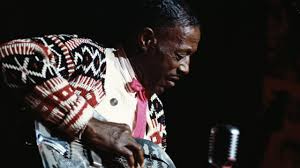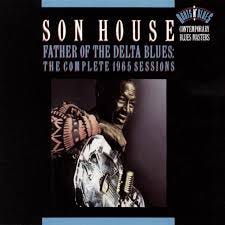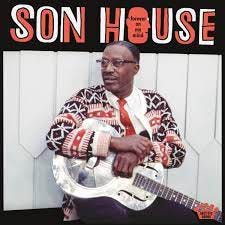When the blues hunters found him, Son House was living in Rochester New York. Didn’t own a guitar. He’d abandoned music decades earlier, and if accounts from media back then are accurate, he was working odd jobs as cook or a railroad porter.
He’d been so far removed from his previous bluesman life, he had to be told that recordings he’d made decades earlier, for Paramount Records (1930) and the Library of Congress (1941), were revered by young (mostly British) musicians who were leading a fast-moving revival of rural Delta blues.
House was away for so long, he had to relearn everything he used to do instinctually. After his rediscovery in June 1964, House played daily with a young guitarist named Alan Wilson, later of Canned Heat (whose discography includes a torrid 1971 collaboration with John Lee Hooker, Hooker N’ Heat), who’d studied House’s bottleneck slide guitar techniques and could point out the interpretational differences between various recorded versions of House’s tunes.
“Without Al invigorating and revializing Son, there would have been no Son House rediscovery,” the manager and blues archivist Dick Waterman told Blues Access magazine in 1998. “Al Wilson taught Son House how to play Son House.”
The first fruit came in 1965, when the Mississippi-born House (with Wilson on four tracks) recorded the austere and thrilling Father Of the Delta Blues for Columbia Records. It was a followup of sorts to field recordings, made by Alan Lomax and others, a quarter-century before, in the early 1940s. And it kickstarted the second coming of Son House – a remarkable cultural-heritage story in which an artist with origins stretching back to the headwaters of rural Delta blues parachuted into rock and roll America to remind subsequent generations of the primacy of blues. In its most visceral, unvarnished, least showbiz-friendly form.
Last Friday, Easy Eye Sounds expanded this story with the previously unissued Forever On My Mind – a performance recorded in November 1964 at Wabash College in Indiana. The date is crucial: It’s before the Columbia studio sides, before House returned to the touring grind. Before any hype, or much press coverage at all. His voice is strong and expressive, his slashing and swerving bottleneck guitar phrases exude a gruff kind of assurance. (Even when, as occasionally happens, he misses a downbeat…).
And, significantly, the song list includes backbones of House’s repertoire. There’s a chilling “Death Letter Blues” that moves at a slower cadence than previous versions – a shift that magnifies the layered sorrow of the song, while throwing an unusual spotlight on House’s anguished, tensed-up phrasing. There’s a wry, almost playful treatment of “Preachin’ Blues” told in multiple verses that satirize both churchgoers and ministers – ironic since before his blues career, House was a traveling preacher. There’s an extended “Levee Camp Moan” that is alive with the lingering supernatural resonances House wrung from his National Duolian guitar.
Just the crisp sonics make this EP, which was produced by Dan Auerbach of the Black Keys, a significant contribution to the Son House legacy. It’s intimate and up-close, but not always in a sexy way: We hear him sighing before drawing a breath and clearing his throat and snorting between lyrics, being human in ways that are typically airbrushed out of live recordings. And then, when he gets comfortable, we hear Son House singing these songs as though reconnecting to their cathartic potential. He’s severe. He’s disarmingly sad. He’s simmering inside. This is no ritualized re-creation of blues tropes; we sense him processing the emotion phrase by phrase. He’s using restraint, deciding just how brutal to be, expressing the eternal essence of the blues with the tools available to him in the moment.
Why yes, we have a fancy digital suggestion box. Share your favorite Underloved/Overlooked records here: echolocatormusic@gmail.com.
Please consider subscribing (it’s still free!). And…..please spread the word! (This only works via word of mouth!).








Thanx T!!
Thanx T!!